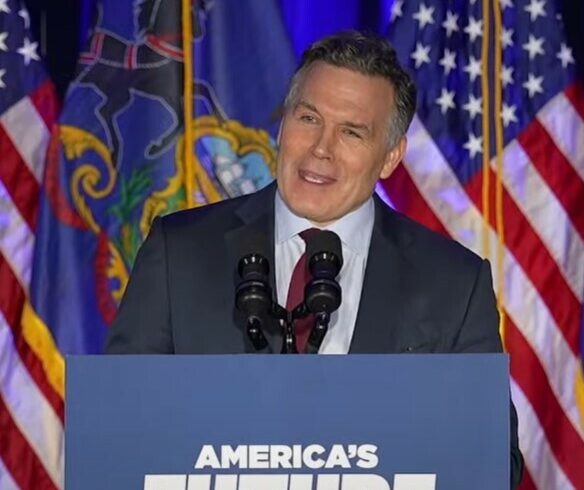“China poses the gravest threat to our security and our wellbeing since the end of World War II.”
That was David McCormick’s message in a speech Thursday, delivered in the shadow of Philadelphia’s Independence Hall. The Republican U.S. Senate candidate’s foreign policy address made it clear he believes America “is in a contest for our prosperity” against Beijing.
“If we lose, we sacrifice the future long promised to our daughters and their children. The Biden administration is taking us on a dangerous path,” McCormick said. “I am proposing a new one.”
McCormick’s China policy is centered around a series of “dramatic policy changes” he said would slow Communist China’s efforts at expansion. He decried incremental change in U.S.-China policy, arguing for a major overhaul instead.
McCormick called the 4,000 fentanyl overdose deaths in Pennsylvania a tragedy and one that could be stopped if the U.S. and its allies took a tougher stance against China. According to the U.S. Department of Justice, “fentanyl and methamphetamine precursors, opioid additives, and synthetic opioids are manufactured and distributed by China-based chemical companies.”
“We must use sanctions, intelligence resources, military interdictions at seas, and all the tools at our disposal to make it difficult – if not impossible – to produce fentanyl with ingredients originating in China,” McCormick said. To those who might see his policy as too extreme, he added: “I think this fentanyl epidemic is extreme, and it’s time for serious measures to stop it.”
Other proposals include pushing for the removal of China from the World Trade Organization (WTO) and revoking Beijing’s permanent normal trade relations status.
“Going forward, we must chart a new path on trade that focuses on shifting critical supply chains to more reliable trading partners or, even better, bringing them home,” he said. McCormick hopes to keep American farmers protected from any sort of economic coercion from China. “This is a massive project that will require leaders in Washington who understand this challenge.”
McCormick also pushed policies to end U.S. reliance on Chinese-imported lithium batteries and solar panels. Subsidizing green tech dominated by China and its resources “might as well be a direct transfer from Pennsylvanian’s bank accounts to the CCP [Chinese Communist Party],” he said.
He added the U.S. needed to stop trade and investment that supports the CCP’s national security state.
“It’s unconscionable to me to consider the possibility that U.S. dollars would fund a military buildup that could one day be deployed against Pennsylvania’s sons and daughters,” he warned. “We must now presume that Chinese companies seeking U.S. financing or technology will become partners to China’s military and security services.”
McCormick advocated for Congress to aggressively cut off U.S. investment in Chinese technology companies critical to national security. American companies should also be banned from working with the Chinese army, he added. Also important to McCormick is that all public corporations and investment funds reveal Chinese investment in public filings.
Perhaps the most popular proposal involved removing China from the World Health Organization (WHO). Calling it obvious, McCormick said China and the Wuhan Institute of Virology behaved recklessly and refused transparency regarding the COVID-19 pandemic.
“Everyone in this audience was affected by [the pandemic],” he declared after cheers from the crowd. “From those we lost to those who lost their jobs. To years of education that were lost from lockdowns…I won’t have it. I won’t stop until China is removed from the World Health Organization.”
His last proposal involved a ban on strategic purchases of American land by the CCP. McCormick tied the policy to food security in the U.S., saying American farmland was a “strategic asset” that needed protection. He believes any significant purchase of land by Chinese companies or individual should have a national security review.
“Our enemies are at the gate, led by the Chinese Communist Party,” McCormack warned. “As we speak, China is propping up Russia and buying Iranian oil so the jihadist regime in Tehran can fund terrorism against Israel and the United States.”
Before McCormick’s speech, protestors drove a billboard truck through Philadelphia, pointing out that he and Bridgewater Associates, the hedge fund he once ran, did business with China.
McCormick faced the criticism head-on, acknowledging that Bridgewater had investments in China, but dismissed the relevance of the criticism. “These attacks are predictable,” McCormick said. “The real question is who has the will and strength to act.”
Should he win the GOP primary, McCormick would face incumbent Democrat U.S. Sen. Bob Casey next November. McCormick would like Casey to say whether he agrees with McCormick’s China proposals, but he doesn’t expect any answer.
“The senator has proven for two decades he won’t stand firm against the CCP or stand up for a stronger and more resilient America. He has dithered while China moved aggressively. He has failed and should be replaced.”

